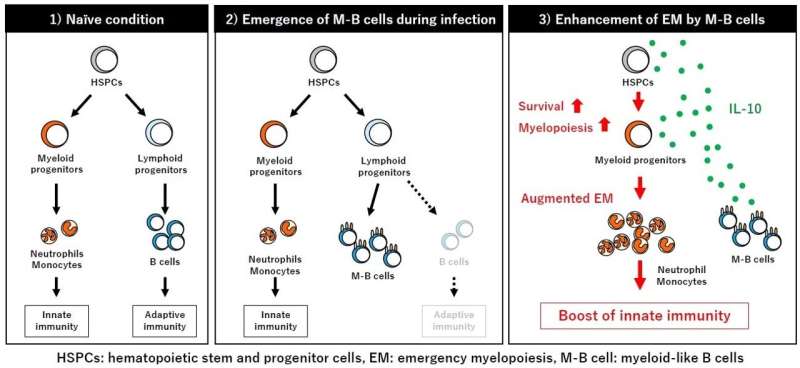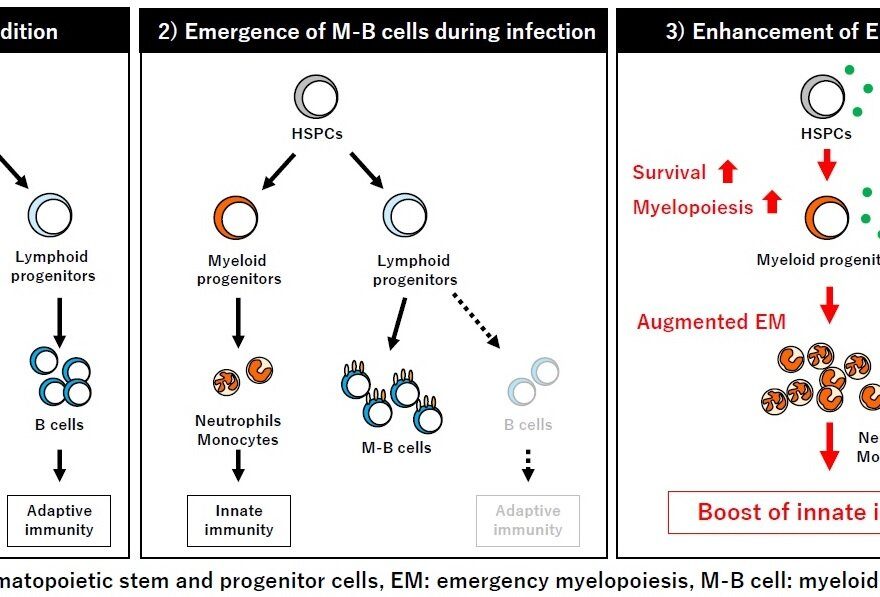
Researchers from Japan have found that white blood cells, known as B lymphocytes, have a pivotal role in promoting an emergent response to stimulate the in-demand production of innate immune cells during an infection.
In a study published last month in the Journal of Experimental Medicine, researchers from Tokyo Medical and Dental University have revealed that myeloid-like B cells (M-B cells), a unique subset of B lymphocytes, signal to enhance the generation of innate immune cells in a process known as emergency myelopoiesis (EM). This biological process emerges in response to danger to eliminate microbial threats.
During a bacterial infection, the immune system stimulates two phases of the immune response, innate and adaptive immunity, to discriminate “self vs. non-self.” The innate immune response serves as the first line of defense; however, in an early stage of infection when the adaptive immune responses are not triggered, B lymphocytes, a key player of adaptive immunity, provide a boost to enhance the protection by innate immunity.
“It was a mystery as to whether and how adaptive immune cells contribute to EM induced by infection,” explains the lead author of the study, Masashi Kanayama. “In this research, we aimed to solve this mystery and revealed a new subset of B lymphocytes that express myeloid markers and IL-10, and act as a booster of EM.”
Researchers developed an infected mouse model in mice lacking IL-10 selectively in B cells. This system was utilized in various biomedical experiments to measure the impact of B cell-derived IL-10 in the magnitude of EM.
Additionally, the cecal ligation and puncture (CLP) mouse model was used to determine if the reinforcement of EM eliminated bacterial invaders. CLP is a procedure to induce sepsis, a life-threatening medical emergency post-infection. The results demonstrated that M-B cell-derived IL-10 amplified EM by the enhancement of myeloid progenitor survival and myeloid-biased hematopoiesis to improve the early innate immune response to foreign invaders.
“The ability of our vertebrates to adapt to highly infectious environments is, surprisingly, due to the enhancement of myelopoiesis by the unique B cells of the acquired immune system,” suggests co-author of the study, Toshiaki Ohteki.
Revealing the identity of the mysterious subset of B lymphocytes highlights the importance of adaptive immune cells to signal SOS during an emergency. Understanding the interaction between innate and adaptive immune responses in humans is critical to combating serious infectious diseases and increasing survival.
More information:
Masashi Kanayama et al, Myeloid-like B cells boost emergency myelopoiesis through IL-10 production during infection, Journal of Experimental Medicine (2023). DOI: 10.1084/jem.20221221
Journal information:
Journal of Experimental Medicine
Source: Read Full Article
